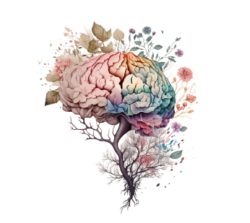Toe In The Water
Autistic adults report feeling misunderstood and unsupported by mental health services that seem more concerned with focusing on their deficits1. That being said, living in a world not designed for you can make you more susceptible to mental health challenges. Anxiety and depression are commonly co-occurring conditions in the Autistic population2. In fact, research has found that these struggles not only persist throughout adulthood but significantly worsen over time3. This is where counselling can help. Counselling provides a safe space where you can talk about whatever issue you are struggling with. Counsellors are trained to listen in a way that supports you to be able to view both your internal and external experiences with more clarity. This allows you and your counsellor to investigate what is contributing to your distress and to discover and develop more helpful ways of responding to it.
Neurokindred is a counselling service for neurodivergent adults by those with lived experience. Anyone aged 18+ either formally or self-diagnosed as Autistic and/or ADHD can be a candidate for counselling. We are LGBTQIA+ affirmative and committed to diversity, inclusion, and equity. We provide online and text-based counselling services. There is no referral needed.
At Neurokindred our focus is supporting your well-being.
We view Autistic brains as a natural expression of human diversity with both strengths and challenges. We also attribute that many of these challenges result from the inflexibility of society to accommodate difference easily.


Finding the right counsellor
The most important ingredient that predicts successful counselling outcomes is the working relationship between you and your counsellor.4 Hume (2022) found this to be especially true for Autistic clients. A counsellor may have skills, knowledge and experience, but for a strong relationship to develop it is vital that they are a suitable fit for you. To develop trust and rapport like this takes time. So, allow several sessions to see whether you and your counsellor work well together.
As can be seen in Figure 17, what YOU (the client) bring to the counselling session is the most powerful predictor of success (40%). Specifically, your willingness to grow and change, your hope, your determination, relationships in your life that are supportive, and your own skills.
Secondly, the WORKING RELATIONSHIP, how well you and your counsellor connect, significantly influences outcomes (30%). This has been found to be especially true for Autistic adults who report that a relationship, characterized by authenticity, empathy, and feeling liked, was the primary determining factor in the success of therapy. 4 5
Neurokindred offers subsidised sessions for initial appointments.
As Autistic adults we have often been disappointed by the misattunement experienced when working with mental health professionals. Research into conditions that best support Autistic adults suggests allowing time for the establishment of rapport and trust.6
To honour this need, Neurokindred offers subsidised sessions for initial appointments. You have so much to gain from a counselling relationship built on authenticity, empathy and care. Make the call today to Neurokindred and invest in your mental health through a client-centered experience. Your well-being deserves strong support from a service specifically designed for neurodivergent adults.

References
1. Camm-Crosbie, L., Bradley, L., Shaw, R., Baron-Cohen, S, & Cassidy, S. (2019). People like me don’t get support: Autistic adults’ experiences of support and treatment for mental health difficulties, self-injury and suicidality. Autism, 23(6) 1431-1441.
https://doi.org/10.1177/1362361318816053
2. Lever, A. G. & Geurts, H. M. (2016). Psychiatric co-occurring symptoms and disorders in young, middle-aged, and older adults with autism spectrum disorder. Journal of Autism & Developmental Disorders, 46, 1916–1930. https://doi.org/10.1007/s10803-016-2722-8
3. Roestorf, A., Howlin, P., & Bowler, D.M. (2022). Ageing and autism: A longitudinal follow-up study of mental health and quality of life in autistic adults. Frontiers in Psychology, 13. http://dx.doi.org/10.3389/fpsyg.2022.741213
4. Flückiger, C., Del Re, A. C., Wampold, B. E., & Horvath, A. O. (2018). The alliance in adult psychotherapy: A meta-analytic synthesis. Psychotherapy, 55(4), 316–340. https://doi.org/10.1037/pst0000172
5. Hume, R. (2022). Show me the real you: Enhanced expression of Rogerian conditions in therapeutic relationship building with autistic adults. Autism in Adulthood, 4(2) 151-163. http://doi.org/10.1089/aut.2021.0065
6. Petty, S., Donaldson, C., Whetton, J. & Baxter, N. (2023). Recommended adaptations to therapy services for autistic adults from specialist clinicians. Current Psychology, 42(2), 29581-29588. https://doi.org/10.1007/s12144-022-04034-6
7. Asay, T. P., & Lambert, M. J. (1999). The empirical case for the common factors in therapy: Quantitative findings. In M. A. Hubble, B. L. Duncan, & S. D. Miller (Eds.), The heart and soul of change: What works in therapy (pp. 23–55). American Psychological Association. https://doi.org/
